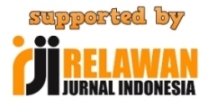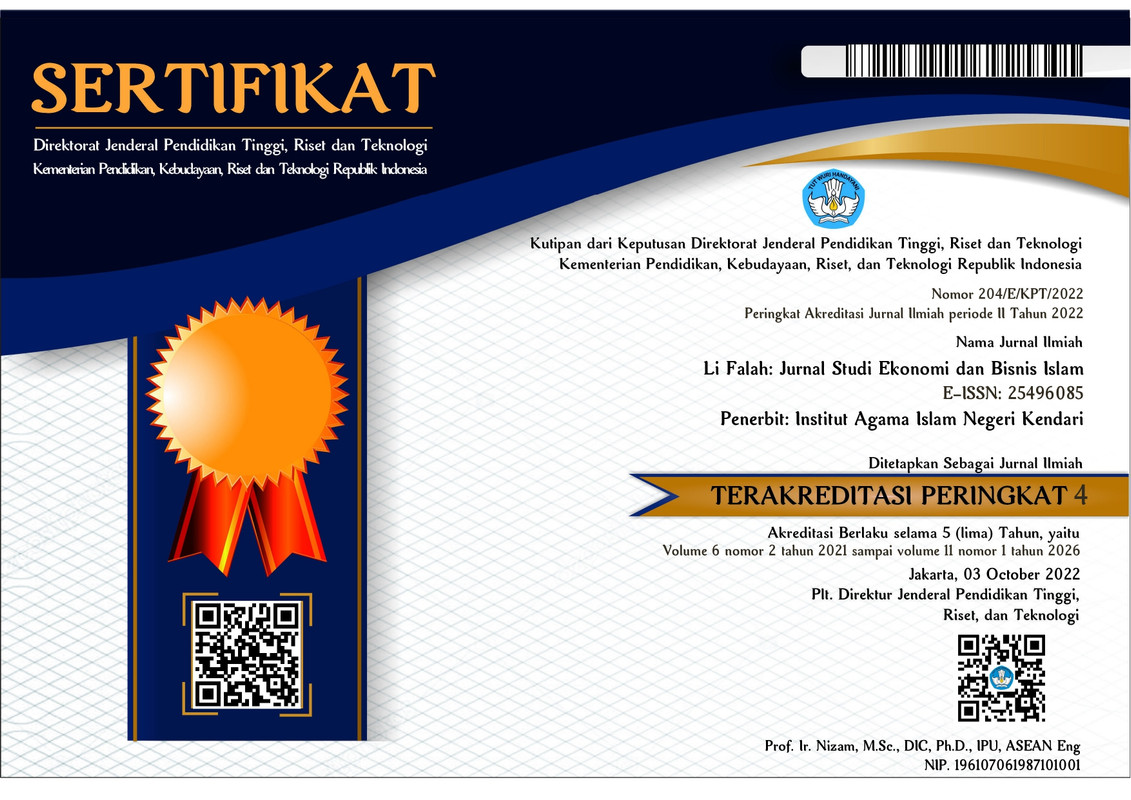Investigating Islamic Business Ethics Practice Toward Millennial Muslim Generation
Abstract
Islamic business ethics has the most basic purpose of a business, which is to benefit and take blessings from activities carried out by others who need it. This study aims to find out how the application of business ethics among the Muslim millennial generation is in accordance with business ethics in Islam. Later, it is hoped that the results of this paper can be used as a working concept (framework) or model for other business actors. The research was conducted in the form of a descriptive study using literature and research development based on the results of research that had been done previously. The results show that business actors among the Muslim millennial generation have implemented Islamic business ethics. In running a business or business activities, business people have understood and practiced the basic principles or values of Islam based on the Qur'an and Hadith. The application of business ethics in Islam includes several aspects, namely principles, prices, marketing (advertising or promotion), and production.
Keywords
Full Text:
PDFReferences
Amalia, F. (2013). Etika Bisnis Islam : Konsep Dan Implementasi Pada Pelaku Usaha Kecil. Jurnal Al-Iqtishad, 95, 116–125.
Baidowi, A. (2011). ETIKA BISNIS PERSPEKTIF ISLAM. E-Journal.Stain-Pekalongan.Ac.Id, 9, 239–250.
Bardakci, A., Kadirov, D., Fam, K. S., Vuchkovski, D., & Richard, J. (2021). Chinese social capital in a business context: the impact of business ethics, business etiquette and business orientation on relationship building and performance. European J. of International Management, 1(1), 1. https://doi.org/10.1504/ejim.2021.10029765
Buldan, H., Hamid, E. S., Sriyana, J., & Tohirin, A. (2021). The Role of Islamic Business Ethics and Market Condition on Organizational Performance. 8(1), 781–790. https://doi.org/10.13106/jafeb.2021.vol8.no1.781
Chapelle, C. (1990). The Discourse of Computer-Assisted Language Learning: Toward a Context for Descriptive Research. TESOL Quarterly, 24(2), 199. https://doi.org/10.2307/3586899
Childs, R. D., Robinson, P., Mcgovern, T. M., & Gingrich, G. (2015). The millennial generation. Transforming American Governance: Rebooting the Public Square, 307–321. https://doi.org/10.1177/2158244017697158
Cragg, W. (1997). Teaching business ethics: The role of ethics in business and in business education. Journal of Business Ethics, 16(3), 231–245.
Davies, G. (2020). 2020 Developing a Business Strategy : Profits From Prophets ? August. https://www.dontthinkcheck.co.nz/wp-content/uploads/Developing-a-Business-Strategy-Profit-From-Prophets.pdf
Davis, K. (1973). The case for and against business assumption of social responsibilities. Academy of Management Journal, 16(2), 312–322.
De Moya Anegón, F., Jiménez Contreras, E., & De La Moneda Corrochano, M. (1998). Research fronts in library and information science in Spain (1985-1994). Scientometrics, 42(2), 229–246. https://doi.org/10.1007/BF02458357
Dwiatma, B. K. (2019). Jurnal Ilmu Dakwah & Pembangunan. Jurnal Ilmu Dakwah Dan Pembangunan, XIV(1), 59–70.
Eddy, S. W. N., Schweitzer, L., & Lyons, S. T. (2010). New generation, great expectations: A field study of the millennial generation. Journal of Business and Psychology, 25(2), 281–292. https://doi.org/10.1007/s10869-010-9159-4
Farid, M., & Zahroh, A. (2015). Analisis Penerapan Etika Bisnis Islam Dalam Perdagangan Sapi di Pasar Hewan Pasirian. IQTISHODUNA: Jurnal Ekonomi Islam, 4(2), 13–30.
Fauroni, L. (2003). REKONSTRUKSI ETIKA BISNIS : PERSPEKTIF AL-QUR ’ AN. IQTISAD Journal of Islamic Economics, 4(1), 91–106.
Fauzia, I. Y. (2018). Etika Bisnis dalam Islam (Edisi Pert). Prenada Media.
Freeman, R. E., Parmar, B. L., & Martin, K. (2020). BUSINESS AND ETHICS. Columbia University Press.
Ghosh, K. (2016). Moving toward a Better Business Model for the Millennial Generation. The Global Studies Journal, 9(3), 21–30. https://doi.org/10.18848/1835-4432/cgp/v09i03/21-30
Hadziq, M. F. (2017). Entrepreneurship: Sebuah Pendekatan Perspektif Islam. Kewirausahaan Dalam Multi Perspektif, 21–31.
Hastuti, E. W., & Anggara, F. S. A. (2017). Implementation of Islamic Business Ethics Values based on IFSB 09: BMT La Tansa Ponorogo Experience. Al Tijarah, 3(2), 119. https://doi.org/10.21111/tijarah.v3i2.1935
Jabbar, S. F. A., Ali, H. M., Mohamed, Z. M., & Jalil, F. (2018). Business Ethics: Theory and Practice in an Islamic Context. Accounting, Finance, Sustainability, Governance and Fraud, 257–271. https://doi.org/10.1007/978-981-10-8062-3_14
Kom, A. E. T. S. I. (2021). Etika Bisnis Islam. Deepublish.
Marzuqi, A. Y., & Latif, A. B. (2010). Manajemen Laba Dalam Tinjauan Etika Bisnis Islam. Jurnal Dinamika Ekonomi&Bisnis, 7(1), 1–22.
Mayssara A. Abo Hassanin Supervised, A. (2014). Ekonomi Managerial. Paper Knowledge . Toward a Media History of Documents.
Niessen, L., & Bocken, N. M. P. (2021). How can businesses drive sufficiency? The business for sufficiency framework. Sustainable Production and Consumption, 28, 1090–1103. https://doi.org/10.1016/j.spc.2021.07.030
Norvadewi. (2015). Bisnis Dalam Perspektif Islam. Jurnal Ekonomi Dan Bisnis Islam, 148, 148–162.
Özçelik, G. (2015). Engagement and Retention of the Millennial Generation in the Workplace through Internal Branding. 10(3), 99–107. https://doi.org/10.5539/ijbm.v10n3p99
Quinn, J. J. (1997). Personal Ethics and Business Ethics : The Ethical Attitudes of Owner / Managers of Small Business. 119–127.
Rafiki, A., & Wahab, K. A. (2014). Islamic values and principles in the organization: A review of literature. Asian Social Science, 10(9), 1–7. https://doi.org/10.5539/ass.v10n9p1
Rice, G. (1999). Islamic ethics and the implications for business. Journal of Business Ethics, 18(4), 345–358. https://doi.org/10.1023/A:1005711414306
Safrillah, Iwan Wahyuddin, W. (2010). ETIKA BISNIS DALAM PERSPEKTIF ISLAM. Fokus Ekonomi, 9.
Suhanda, R., & Fahrullah, A. (2020). Islamic Business Ethics on Customer Retention. 390(Icracos 2019), 57–60. https://doi.org/10.2991/icracos-19.2020.12
Syahruni, & Abdullah. (2019). ISLAMIC ENTREPRENEURSHIP BASED ON THE CONCEPT. IQTISHODUNA: Jurnal Ekonomi Islam, 39–50.
World Economic Forum. (2019). Computer Fraud & Security. https://doi.org/10.1016/s1361-3723(19)30016-8
Zamzam, H. F., & Aravik, H. (2020). Etika Bisnis Islam Seni Berbisnis Keberkahan (Cetakan Pe). Deepublish.
DOI: http://dx.doi.org/10.31332/lifalah.v8i1.3192
Copyright (c) 2023 Nur Laili

This work is licensed under a Creative Commons Attribution-ShareAlike 4.0 International License.
Li Falah : Jurnal Studi Ekonomi dan Bisnis Islam, Indexed In
Accredited By
View My Stats
Organized by : Fakultas Ekonomi dan Bisnis Islam
Published by : Institut Agama Islam Negeri Kendari
Jl. Sultan Qaimuddin No. 17 Baruga Kota Kendari Provinsi Sulawesi Tenggara
phone. +62401-3193710
Fax. +62401-3193710
Email: [email protected]



















